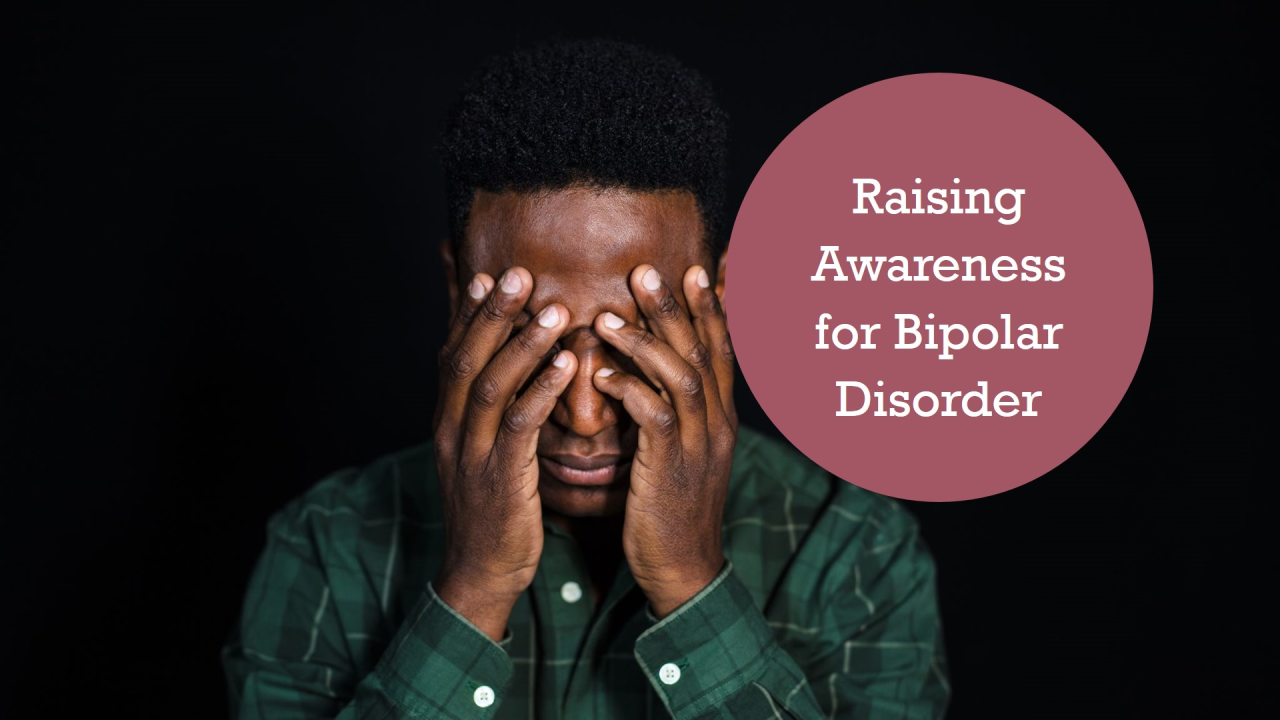

Dr. Yennusom Maalug, a psychiatrist at Pantang and The Bank Hospitals, has issued a warning about the dangers of untreated bipolar disorder. According to Dr. Maalug, untreated bipolar disorder can lead to severe mental health challenges, including suicidal thoughts, substance abuse, and a diminished quality of life. He explained that the disorder, which involves extreme mood swings, can push individuals to engage in dangerous behavior such as self-harm or substance abuse in an attempt to escape their overwhelming feelings.
While the exact cause of bipolar disorder is not fully understood, Dr. Maalug highlighted a combination of genetic, biochemical, and environmental factors as contributors. Family history, stress, loss of a loved one, and personal disappointment can trigger or worsen the condition. Though the disorder may have a genetic component, it does not necessarily mean it will be passed down to children.
Bipolar disorder typically presents in two phases: mania and depression. Mania can involve extreme energy, impulsivity, and erratic behavior, such as rapid speech or inappropriate actions. In depressive phases, patients may experience persistent sadness, loss of interest in activities, changes in appetite, and disrupted sleep patterns. Dr. Maalug stressed that while patients may be aware of their abnormal behavior, they often cannot control it.
Diagnosing bipolar disorder can be challenging, especially when initial symptoms are only depressive. A full history and medical tests help differentiate it from other conditions like thyroid disorders or substance abuse.
Effective treatment involves a combination of medication and psychotherapy, which helps individuals manage the condition throughout their lives. Dr. Maalug emphasized that with proper care, those with bipolar disorder can lead fulfilling lives, although relapses are common if medication is discontinued.
When caring for someone with bipolar disorder, Dr. Maalug recommended offering support, encouraging treatment adherence, and understanding the patient’s struggles during both manic and depressive episodes.
About the author
62-Year-Old Businesswoman Remanded Over $13K Fraud
Nana Ama Nwurueze, a 62-year-old self-styled businesswoman, has been remanded by the Adabraka District Court in Accra for allegedly defrauding another businesswoman, Dorothy Asare, of $13,000. Nwurueze reportedly posed as a wealthy businesswoman with substantial properties, including Ohemaa Plaza in East Legon, fishing vessels in Takoradi, and a house at Airport, to deceive the complainant.The prosecution, led by Chief Inspector Apewa Achana, has charged Nwurueze with defrauding by false pretenses. She was arrested after a bench warrant was issued against her in December last year. Despite pleading not guilty, her bail application was denied, as the court determined she was a flight risk. The case was initially reported to the Airport Police Station in 2021, but attempts to arrest her were unsuccessful until her eventual arrest in March 2024. Following her arrest, she was granted police inquiry bail but went […]
Edem 4Style March 26, 2025
President Mahama Nominates 71 New DCEs Pending Approval
President John Mahama has nominated 71 new District Chief Executives (DCEs) across various districts in Ghana, pending approval by local Assembly members. This move is aimed at strengthening local governance as these executives are expected to play a crucial role in the management of their respective districts.An official statement detailing the nominations was signed by Dr. Callistus Mahama, the Secretary to the President, and addressed to the Minister of Local Government, Chieftaincy, and Religious Affairs.While most districts have their nominees, the nomination for the Kpando district is still pending. The new DCEs will need to be confirmed by the Assembly members in their respective districts before they officially take up their roles.
Edem 4Style March 26, 2025
FIC Freezes Accounts of Bills Micro-Credit Founder, Richard Nii Armah Quaye
The Financial Intelligence Centre (FIC) has frozen all accounts associated with Richard Nii Armah Quaye, the founder of Bills Micro-Credit. This includes accounts linked to Bills Micro-Credit, Quick Credit and Investment Micro-Credit, as well as an account of Romeo-Richlove Kweku Seshie, the Chief Executive Officer of Bills Micro-Credit.The action follows a letter from the FIC, in line with Section 56(1) of the Anti-Money Laundering Act, 2020 (Act 1044), and applies to all accounts connected to the named individuals, pending further instructions. The FIC’s role involves analyzing suspicious transactions related to money laundering, terrorist financing, and other financial crimes.The move comes after a statement from the Ghana Revenue Authority revealing that Nii Armah Quaye is undergoing a personal income tax assessment for over GHS 30 million in unpaid taxes. This freeze is part of regular regulatory oversight to ensure compliance with […]
Edem 4Style March 26, 2025
Over 1,350 ECG Containers Missing from Tema Harbour Amid Procurement Breaches – Energy
The Minister for Energy and Green Transition, John Abdulai Jinapor, has raised significant concerns over the disappearance of more than 1,350 containers belonging to the Electricity Company of Ghana (ECG) from the Tema Harbour. A committee tasked with investigating the matter has uncovered serious procurement breaches that have been ongoing for several years.Jinapor shared a 103-page report on the matter, describing the findings as alarming, with a clear indication of irregularities that have affected the country’s energy sector. The Minister emphasized that law enforcement agencies would be involved to ensure that those responsible for the missing containers and procurement violations are held accountable.The disappearance of the containers and the associated procurement irregularities have sparked concerns about transparency and accountability within Ghana's energy sector, urging the government to take swift action.
Edem 4Style March 26, 2025
Ex-FIFA Chief Blatter and Platini Cleared in Corruption Case
Former FIFA President Sepp Blatter and French soccer legend Michel Platini have been cleared of corruption charges by a Swiss court. The pair were accused of authorizing a 2 million Swiss franc payment to Platini in 2011. The court ruled that there was insufficient evidence to prove the payment was fraudulent, acknowledging their consistent account of an oral agreement for the payment.The decision marks the end of a long-running legal battle, which began in 2015 and resulted in their suspension from football by FIFA. Both Blatter and Platini expressed relief following the verdict. Platini declared that his honor had been restored, while Blatter described the case as a burden that had hung over him for years.Swiss federal prosecutors are reviewing the decision and may appeal to the Swiss Federal Court.
Edem 4Style March 26, 2025
Idris Elba Honored as a Son of Ga Land, Announces Film Studio Project in Accra
On March 25, 2025, renowned British actor and filmmaker Idris Elba was honored as a son of Ga Land in a grand ceremony at the Ga Mantse Palace in Accra. The event, under the reign of King Tackie Teiko Tsuru II, celebrated Elba’s contributions to the African diaspora and his dedication to developing Ghana’s creative industry.Elba’s visit included an exciting announcement: he plans to build a world-class film studio and school on 22 acres of land near Osu Castle. This project aims to provide training, employment, and a creative hub for young Ghanaian talent, with a focus on African cinema.King Tackie Teiko Tsuru II expressed strong support for the initiative, emphasizing the need to guide the youth and advance the creative arts. The announcement was met with applause and marked a significant moment for Ghana’s growing role in the global […]
Edem 4Style March 26, 2025
Related
Education Ministry Consoles Families of Drowned Lawra SHS Students
In response to the tragic drowning of seven students from Lawra Senior High School, Ghana’s Ministry of Education, along with the Ghana Education Service (GES) and NADMO, has offered heartfelt condolences and support to the bereaved families. 1. Rescue Recovery Efforts The canoe carrying ten cadet-based SHS students capsized on the Black Volta River (River Dikpe) on Saturday, June 14, 2025, during a routine jogging session. While three students managed to swim to safety, seven tragically drowned. The final two bodies were recovered early Sunday morning, ending a nearly 24-hour search operation by a combined team of volunteers, police, GES officials, and NADMO personnel. 2. Ministry’s Consolation Role As verification of the recovery effort, officials from the Ministry of Education, GES, and regional disaster managers visited the affected families to express condolences and coordinate psychosocial and financial assistance. The Director-General […]
Ahmad June 15, 2025
Ablakwa Announces Stricter Visa Regulations to Block Illegal Mining Nationals
Ghana’s Minister of Foreign Affairs, Samuel Okudzeto Ablakwa, has announced stricter visa requirements aimed at preventing the entry of foreign nationals intending to participate in illegal small-scale mining (galamsey). The announcement follows his recent diplomatic talks in China, where the focus was on stemming the flow of would-be galamsey operators from regions such as Nanning. 1. Why the New Visa Rules? Officials warn that some visas are being exploited by foreign nationals looking to engage in illegal mining. The new procedures will screen applicants more closely for intended engagement in galamsey, especially in regions known for sending illegal miners to Ghana. 2. Diplomatic Push in China During a June 14 meeting with Nanning city officials—including the Vice Mayor—Ablakwa described discussions as "frank and positive." He emphasized that the Mahama administration will not tolerate illegal mining whether by locals or foreigners, and […]
Ahmad June 15, 2025
GRA Postpones Implementation of Energy Sector Levy Scheduled for June 16
Ghana’s Ghana Revenue Authority (GRA) has indefinitely postponed the roll-out of the Energy Sector Shortfall and Debt Repayment Levy (ESSDRL)—a GH¢1 per litre fuel surcharge slated for June 16, 2025—after stakeholder consultations and a directive from the Finance Ministry. 1. Levy Background Introduced under the Energy Sector Levies (Amendment) Act, 2025 (Act 1141), the levy was fast-tracked through Parliament—with an estimated GH¢5.7 billion in annual revenue intended to cover energy-sector debts and stabilize power supply. 2. Reason for Postponement The GRA cited a directive from the Minister of Finance, following input from industry stakeholders such as AOMCs, NPA, and Ghana Link Network Services, requiring further operational and technical readiness before implementation. 3. Official Spokesperson’s Statement In a June 13 public notice, Commissioner-General Anthony Kwasi Sarpong confirmed the levy deferral. All relevant agencies—from ports to oil-marketing companies—have been alerted and told to await […]
Ahmad June 15, 2025
Parliament to Vet Seven Supreme Court Nominees Beginning Monday, June 16
Starting Monday, June 16, 2025, Ghana’s Appointments Committee of Parliament will begin a three‑day vetting exercise for seven Supreme Court nominees, all currently serving as Justices on the Court of Appeal. 1. Who’s Being Vetted? All seven nominees are Appeal Court judges elevated by President John Dramani Mahama under Article 144(2) of the 1992 Constitution. Their names are: Justice Sir Dennis Dominic Adjei Justice Gbiel Simon Suurbaareh Justice Senyo Dzamefe Justice Kweku Tawiah Ackaah‑Boafo Justice Philip Bright Mensah Justice Janapare Bartels‑Kodwo Justice Hafisata Amaleboba 2. Purpose & Structure of the Hearings Over three days (June 16–18), the committee will scrutinize each nominee’s: Judicial competence and experience Knowledge of constitutional and human rights law Integrity and impartiality Judicial philosophy and past rulings Public engagement is expected, with citizens and legal stakeholders urged to submit observations and poses questions to the nominees. 3. […]
Ahmad June 15, 2025
Seven Lawra SHS Students Feared Dead After Canoe Capsizes on Black Volta
A routine morning exercise turned into a tragedy for Lawra Senior High School on Saturday, June 14, 2025, when ten cadet students attempted to cross the Black Volta River near Dikpe in a small canoe. The boat capsized mid-river, and although three students swam to safety, seven are feared drowned. 1. What Happened During their regular jogging routine, the students spotted a canoe in use and spontaneously decided to cross. Midway, the small, overloaded canoe capsized, plunging all ten into the strong Volta current. Three survived, but seven were swept away. 2. Emergency Response Local authorities—including Ghana Police and NADMO—have mobilised divers and volunteers for a full-scale search operation. The Black Volta’s strong currents and lack of safety gear have complicated rescue efforts. 3. Recovery So Far Bodies Retrieved: At least four bodies (two boys, two girls) were recovered. Still Missing: […]
Ahmad June 15, 2025
Mahama Warns Ghana Could Feel Oil Price Shock from Israel–Iran Conflict
President John Dramani Mahama has cautioned that escalating military exchanges between Israel and Iran are already lifting global crude oil prices, posing a real threat to Ghana's economic recovery and domestic fuel affordability. 1. Global Oil Prices on the Upswing The recent missile attacks have triggered a noticeable uptick in Brent and WTI crude prices—by over 7–10%, the most significant jump since the 2022 Ukraine crisis. Market fears center on potential supply disruptions in the Strait of Hormuz and broader Middle East energy infrastructure. 2. Ghana Is Not Immune Despite being a crude oil producer, Ghana remains a net importer of refined petroleum. Mahama warned that surging global oil rates could reverse recent economic gains and impact domestic fuel prices. 3. Ministerial Directives Issued Recognizing the urgency, Mahama has ordered the Ministers of Finance and Energy to: Model the conflict’s […]
Ahmad June 15, 2025













